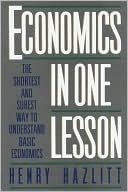More on this book
Community
Kindle Notes & Highlights
Started reading
March 18, 2020
The bad economist sees only what immediately strikes the eye; the good economist also looks beyond. The bad economist sees only the direct consequences of a proposed course; the good economist looks also at the longer and indirect consequences. The bad economist sees only what the effect of a given policy has been or will be on one particular group; the good economist inquires also what the effect of the policy will be on all groups.
and that lesson can be reduced to a single sentence. The art of economics consists in looking not merely at the immediate but at the longer effects of any act or policy; it consists in tracing the consequences of that policy not merely for one group but for all groups.
But need is not demand. Effective economic demand requires not merely need but corresponding purchasing power.
Everything we get, outside of the free gifts of nature, must in some way be paid
Here we shall have to say simply that all government expenditures must eventually be paid out of the proceeds of taxation; that inflation itself is merely a form, and a particularly vicious form, of taxation.
it for granted throughout the present chapter that either immediately or ultimately every dollar of government spending must be raised through a dollar of taxation.
Therefore, for every public job created by the bridge project a private job has been destroyed somewhere else.
This is only another way of saying that the government lenders will take risks with other people’s money (the taxpayers’) that private lenders will not take with their own money.
There is a strange idea abroad, held by all monetary cranks, that credit is something a banker gives to a man. Credit, on the contrary, is something a man already has.
Whenever there is long-continued mass unemployment, machines get the blame anew. This fallacy is still the basis of many labor union practices.
In brief, on net balance machines, technological improvements, automation, economies and efficiency do not throw men out of work.
The first process is essential to the second. It is as foolish to try to preserve obsolescent industries as to try to preserve obsolescent methods of production: this is often, in fact, merely two ways of describing the same thing. Improved methods of production must constantly supplant obsolete methods, if both old needs and new wants are to be filled by better commodities and better means.


